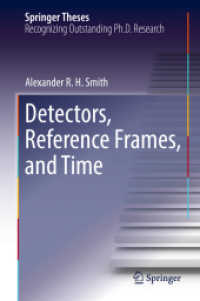- ホーム
- > 洋書
- > 英文書
- > Religion / Ethics
Full Description
This book brings together the interdisciplinary reflections of Christian scholars and poets, to explore how ecological virtues can foster the flourishing of our home planet in the face of unprecedented environmental change and devastation. Its central questions are: What virtues are needed for us to be better caretakers of our home planet? What vices must we extinguish if we are to flourish on the earth? What is the connection between such virtues and vices and the flourishing of all creatures? Each contribution offers insight on ecological virtue ethical questions through disciplinary lenses ranging from biology, geology, and economics, to literature, theology, and philosophy. The chapters feature the legacy and lessons of senior scholars reflecting on a lifetime of earthkeeping work, highlight global concerns and perspectives, and include compelling poetic reflections. Focusing on the way in which human vices and virtues drive so many of our ecological problems and solutions, the volume engages timely issues of environmental importance - such as environmental racism, interfaith dialogue, ecological philosophies of work and economics, marine pollution, ecological despair, hope and humility - encouraging fresh reflection and action. It will be of interest to those working in theology and religious studies, philosophy, ethics, and environmental studies.
Contents
Foreword; Introduction; I. Gifts in Retrospection: Mentors in Ecoflourishing - 1 From Shenandoah to the Mountain West; 2 Crossing Lehigh Gap: Discerning Christian Contributions and Misdirection in Wilderness Preservation; 3 Beholding Earth through the Eye of its Maker; 4 Prophets and Poets: The Capture of the Creative Vision; 5 A Table and a Planet: From Hearthkeeping to Earthkeeping; II. Grounding Narratives of Ecoflourishing and Virtue: Stories Worth Telling - 6 When Good Christians Destroy the Earth: The Virtue of Limits and the Limits of Virtue; 7 "Ecoflourishing" and Story: Fantasy, Science Fiction and Hope; 8 'I all-creation sing': Christina Rossetti's Cosmic Liturgy and Challenge to Anthropocentrism; 9 John Muir, Deep Time, and the Hope of Ecoflourishing; III. Biblical and Theological Soundings: Ecological Ruin, Restoration, and Community Virtues - 10 Subverting Metaphor, Transforming Identity: An Eco-Anthropological Analysis of Job's Shift from Ruler to Member of the Creation Community; 11 Paul, Generosity, and Ecological Flourishing; 12 Ecoflourishing: Life, Death and Natural Disasters; IV. Global Ecoflourishing: Biospheric, Intercultural, and Interreligious - 13 Interdisciplinary Voices of the Ecoflourishing 'Glocal' Dialogue from Non-Western Cultural and Literary Perspectives; 14 Becoming Citizens of the Biosphere: Character, Ecoflourishing, and Control in Our Newfound Common Home; 15 Becoming Human, Intercultural, and Inter-creational: Movements toward Achieving Ecoflourishing; V. Philosophical Remedies: Relationship, Work, Economy - 16 Primary Encounters: Relational Ontology and Ecoflourishing; 17 Toward a Christian Ecological Philosophy of Work; 18 Fairy Tales and True Stories: Economic Talk for Ecological Flourishing; VI. Virtue and Vice in Ecological Practice: Confronting Current Challenges - 19 The Christian Ethics of Waste, Contaminants, and Emerging Pollutants in Marine Ecosystems; 20 Reconciling the Food Chain with the Great Chain of Being: A Philosopher's Reflection on Raising Sheep for Meat; 21 Justice, Biocentrism, and White Supremacy: John Muir's Romantic Christian Ethics; 22 The Virtue of Intersectionality in Environmental Ethics.








